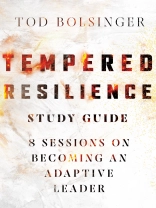Leadership leads to vulnerability that requires the security of relationships to endure.
Tempered Resilience: How Leaders Are Formed in the Crucible of Change is about forming resilience so leaders can lead through the resistance that always accompanies change. Tod Bolsinger, an organizational and pastoral leader, writes that experiencing resistance leaves us feeling ‚exposed, unsure, and often discouraged.‘ Honest and supportive relationships are key to flourishing in these moments of vulnerability. Thus the sessions in this guide are designed to lead to honest conversations for self-discovery as well as offering practices that leaders and their teams can take on together.
Following the structure of review, reflect, relate, and practice, this guide for both individuals and groups will help you to forge the kind of tempered and resilient leadership that the times demand.
Inhaltsverzeichnis
Introduction
1 Hewing Hope and the Mountain of Despair
2 Working: Leaders Are Formed in Leading
3 Heating: Strength Is Forged in Self-Reflection
4 Holding: Vulnerable Leadership Requires Relational Security
5 Hammering: Stress Makes a Leader
6 Hewing: Resilience Takes Practice
7 Tempering: Resilience Comes Through a Rhythm of Leading and Not Leading
8 The Why of Leadership
Notes
Über den Autor
Tod Bolsinger is the founder and principal at AE Sloan Leadership Inc., the executive director of the De Pree Center Church Leadership Institute, and associate professor of leadership formation at Fuller Seminary. He is the author of Canoeing the Mountains and Tempered Resilience. Tod and his wife, Beth, split their time between Pasadena, California, and Ketchum, Idaho.












